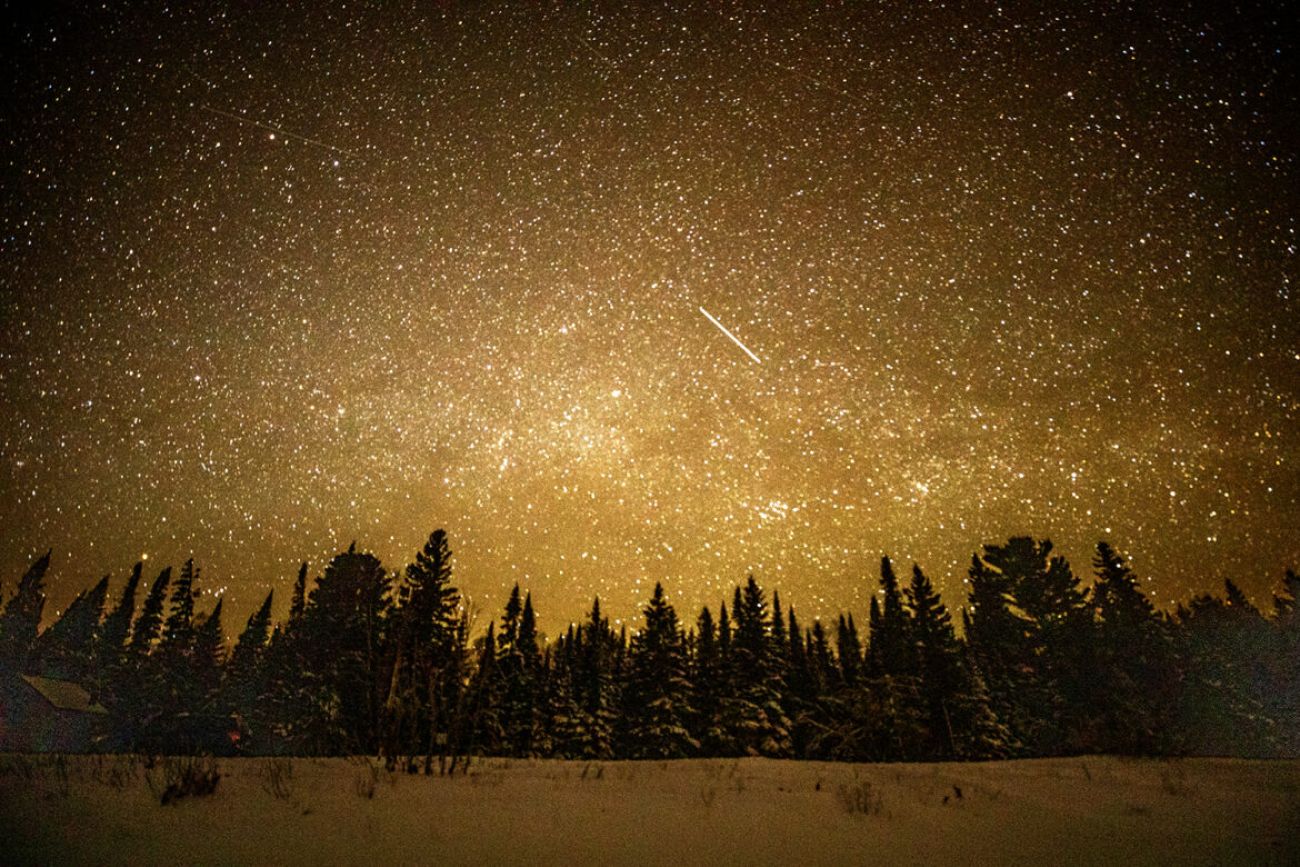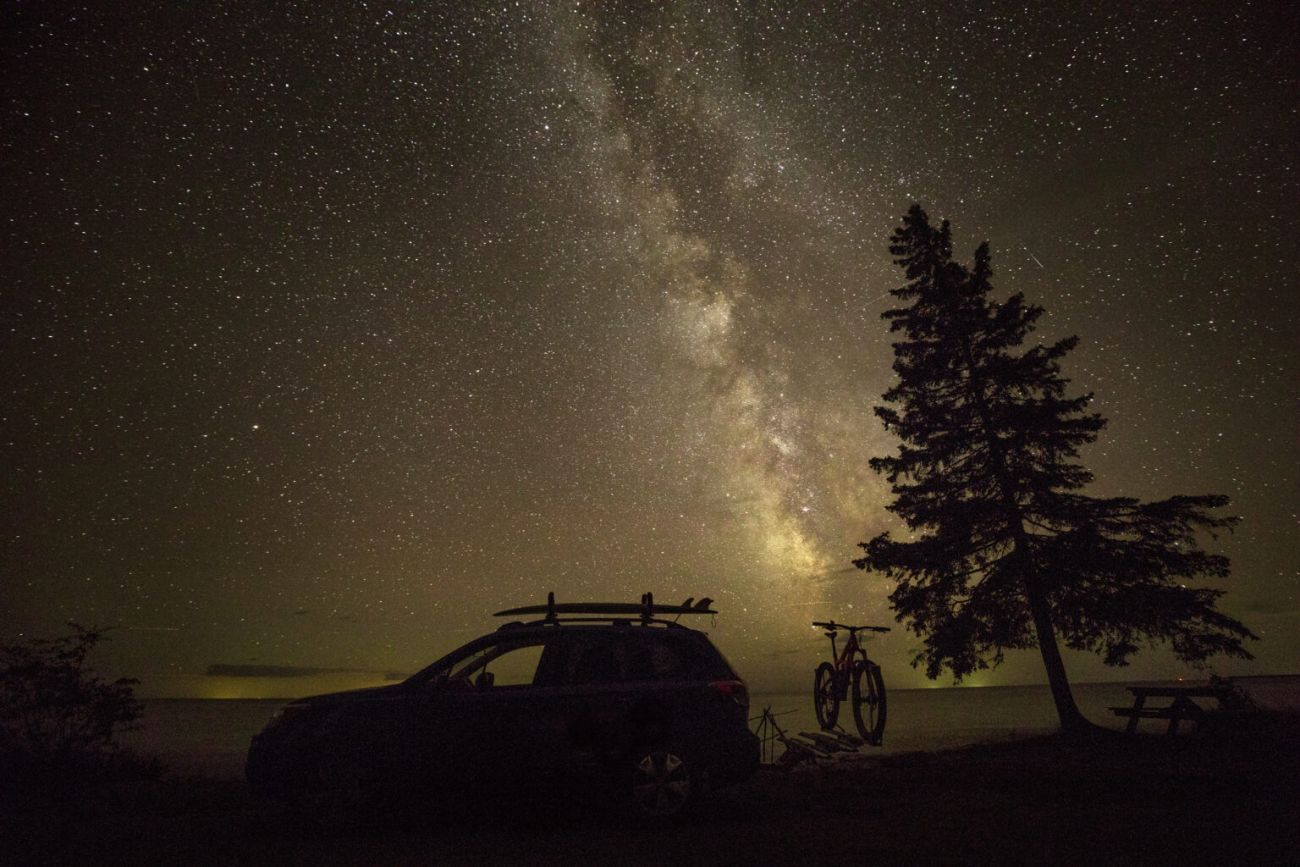Dark sky parks: How Michigan is becoming a stargazing state

LANSING — As the Great Lakes region becomes more aware of dark skies and light pollution, efforts are underway in Michigan to reduce nighttime non-natural lighting.
Although Michigan has no state laws in place to reduce light pollution — alongside 30 other states with no such laws — the number of dark sky protected areas is growing.
Many parks are paying special attention to this trend because of a growing form of tourism: stargazing. And many are coming from across the country to see how Michigan’s glassy waters reflect the night sky.
Related:
- Michigan fall colors 2023: Peak colors may be late. Blame El Niño
- What's being done about plastic trash getting into the Great Lakes?
- The life of Peanut: Inside the story of the world’s oldest living chicken
Mary Adams, a star lore historian from Ann Arbor, said that it “sets the mood.”
“These large bodies of water are like mirrors, reflecting the sky and environment. So it’s quite a poetic and natural expression of something in the world,” she said.
“This is the largest collection of freshwater in the world that is continually reflecting the sky. I think we ought to pay attention to that,” Adams said.
Six state parks are considered dark sky preserves, and an additional three are certified as international dark sky parks by Dark Sky International — an organization devoted to advocacy and conservation.
The six preserves are Lake Hudson Recreation Area in Lenawee County, Negwegon State Park in Alcona County, Port Crescent State Park in Huron County, Rockport Recreation Area in Presque Isle, Thompson’s Harbor State Park in Presque Isle County and Wilderness State Park in Emmet County.
With extra guidelines and protections, the three international dark sky parks are Headlands International Dark Sky Park in Emmet County, Keweenaw Dark Sky Park in Schoolcraft Township near Copper Harbor and Dr. T.K. Lawless Park in Cass County.
The Keweenaw park is the most recent addition to Michigan’s international designated preserves and recently marked the first year of that status.
Going international made it the first in the Upper Peninsula and the world’s first privately owned international dark park.
Since winning its international recognition, its tourism has peaked — with many out-of-state visitors, according to the outdoor activities lead Chris Guibert.
“When doing this, you kind of become an advocate for dark skies, and really once you learn about it, it’s hard to not become one,” Guibert said.
“The point that resonated most with me is up until 100 years ago. the world operated in total darkness at night. There’s a lot of things being affected besides humans,” he said.
Adams said the same.
“Is electric light always the last light I see before I close my eyes and go to bed? And does that matter?” she said.
In 2011 Headlands was the ninth in the world to be recognized internationally.
The park’s experience has influenced successful efforts to protect over 35,000 acres of state-owned land and dark skies, according to its website.
Although there are no state laws specifically intended to reduce light pollution, state parks are required to point down and shield their outdoor lighting.
According to the University of Michigan, light pollution is increasing globally at a rate of 10 percent every year.
However, light pollution is 100 percent reversible — by turning off lights, reworking the shape of an outdoor light or changing the hue.
Adams, who was the Headlands program manager for eight years, helped the park earn international certification.
“I got on the agenda for the Emmet County Board of Commissioners. I told them, ‘You have a park, it’s naturally dark, we can get it protected and we have to get ready because people will come from around the world to come see it.’”
“They laughed at me,” Adams said.
“My experience is that people really want this kind of relationship because they experience a fundamental disconnect in contemporary culture,” she said.
Headlands park manager Jamie Westfall said tourism has been booming with thousands of people showing up on one clear night.
“We’re lucky that we live in an area where the skies are still fairly dark. People travel here to see the features in the night sky that they can’t see in their home area — they don’t get to see the Milky Way, northern lights, constellations or features in the moon,” she said.
“They’re special to our region because we still have dark skies,” Westfall said.
Now Adams is working alongside Dark Sky International to urge the Department of Natural Resources to make Belle Isle State Park in Detroit a dark sky preserve.

Now Adams is working alongside Dark Sky International to urge the Department of Natural Resources to make Belle Isle State Park in Detroit a dark sky preserve.
Urban dark sky parks are less common but just as valuable as those in more remote areas, she said..
Two other locations are being considered as dark sky preserves: Beaver Island in Lake Michigan and Lutz Park in Livingston County.
State officials said they intend to approve Beaver Island’s dark sky sanctuary application soon, which will then head to Dark Sky International for the requested special designation.
The Livingston County park also applied to become an urban night sky park and already hosts dark sky events. Its application is pending.
Guibert said he’s excited to see what’s to come.
“Some of the changes we made might seem radical to others where it seems natural to us,” he said. “But I just really hope we’re turning the tide towards people being aware of the night sky and the impacts for all living species.”
Adams agreed.
“If you go to a theater production – let’s just imagine they need to change the mood on the stage. You don’t move around the props. What you do is you change the lighting,” she said. “Light sets the mood.”
This story was originally published by the Capital News Service.
Michigan Environment Watch
Michigan Environment Watch examines how public policy, industry, and other factors interact with the state’s trove of natural resources.
- See full coverage
- Subscribe
- Share tips and questions with Bridge environment reporter Kelly House
Michigan Environment Watch is made possible by generous financial support from:
Our generous Environment Watch underwriters encourage Bridge Michigan readers to also support civic journalism by becoming Bridge members. Please consider joining today.
See what new members are saying about why they donated to Bridge Michigan:
- “In order for this information to be accurate and unbiased it must be underwritten by its readers, not by special interests.” - Larry S.
- “Not many other media sources report on the topics Bridge does.” - Susan B.
- “Your journalism is outstanding and rare these days.” - Mark S.
If you want to ensure the future of nonpartisan, nonprofit Michigan journalism, please become a member today. You, too, will be asked why you donated and maybe we'll feature your quote next time!






